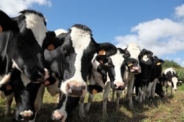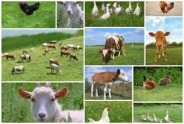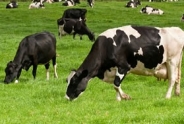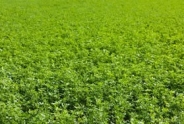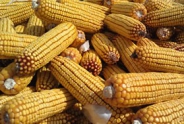Calf Care for Variable Months
Libby Eiholzer, Bilingual Dairy
Northwest New York Dairy, Livestock & Field Crops
Last Modified: June 10, 2013

Fall has arrived, and with it a tricky time of year for calves. Though the weather is getting progressively colder, temperatures can fluctuate from one week to the next and especially from morning to night. On a 70°F day, it can be easy to forget the possibility that the temperature could dip low enough to make young calves suffer overnight.
For calves younger than three weeks of age, the thermoneutral temperature is about 50-80°F. This means that in that temperature range the heat produced by the calf's body is enough to make up for the heat that she loses. When the temperature gets below 50°F, she has to burn extra energy to make up for the heat that she's losing, so her maintenance cost goes up. The more energy used for maintenance, the less energy available for growth and immune function. And since calves are born with very little body fat, they don't have much extra energy to burn off before they actually start to starve!
So what can you do to keep calves healthy this fall? First and foremost, keep them warm and dry. Get newborn calves dry as quickly as possible, and provide them with adequate dry bedding. Putting calf jackets on the smallest calves can help prevent heat loss as well. A calf keeps warm with a jacket on a chilly fall day. La becerra no siente el frio de un día otoñal con su chaqueta.
Don't forget cleanliness! When calves are too cold, they are more apt to get sick. Dip calves' navels with iodine, separate them from adult cows as quickly as possible after birth and keep cow manure away from them. Rinse milk pails and bottles with lukewarm water, and then wash them thoroughly with hot soapy water. Always provide plenty of clean, fresh grain and water.
El Cuidado de los Becerros Durante Unos Meses Variables
Ya llegó el otoño, lo que es un tiempo difícil para los becerros. Aunque la temperatura está bajando progresivamente, las temperaturas pueden cambiar mucho de una semana a la otra y especialmente de la mañana a la noche. Durante un día de 70°F (21°C), se puede olvidar fácilmente de que la temperatura podría bajar bastante para que los becerros chiquitos sufran por la noche.
Para los becerros menos de tres semanas de edad, la zona termoneutral es 50-80°F (10°-27°C). Eso quiere decir que entre estas temperaturas, el calor producido por el cuerpo del becerro es bastante para compensar el calor que pierde. Cuando la temperatura baja a menos que 50°F (10°C), el becerro requiere energía extra para recuperar el calor que pierde, así que el costo de mantener su temperatura corporal sube. Al gastar más energía para mantenerse, hay menos energía para crecer y para protegerse de las enfermedades. Como los becerros nacen sin mucha grasa corporal, no tienen mucha energía extra para gastar antes de empezar a sufrir de la malnutrición.
¿Qué puede hacer usted para que estén sanos sus becerros este otoño? Para empezar, deben estar siempre secos y nunca deben tener frio. Hay que secar los becerros recién nacidos lo más pronto que sea posible y darlos bastante cama seca. Ponerlos chaquetas a los becerros más chiquitos también puede prevenir la pérdida de calor corporal.
¡No se les olviden la limpieza! Cuando los becerros tienen frio, es más posible que se enferman. Moje los ombligos de los becerros con yodo, sepárelos de las vacas adultas lo más pronto que sea posible después del parto y no dejen que tengan contacto con el estiércol de las vacas adultas. Enjuague las cubetas y botellas de leche con agua tibia, y después lávelas con agua caliente y jabón. Siempre deben tener bastante agua y grano fresco y limpio.
Calf Care El Cuidado de los Becerros
Dip the calf’s navel Moje el ombligo del becerro
Separate the calf from the cow quickly Quite el becerro de la vaca rápidamente
Put a jacket on the calf Ponga una chaqueta al becerro
Put dry sawdust/straw in the pen Ponga aserrín/paja seca al corral
First rinse the milk pails with lukewarm water Primero, enjuague las cubetas de leche con agua tibia
Then wash the pails with hot water and soap Después, lave las cubetas con agua caliente y jabón
Upcoming Events
2026 Forage Congress
January 28, 2026
Nunda, NY
Register to attend 2026 Forage Congress!
2026 NWNY Dairy Day
February 5, 2026 : NWNY Dairy Day 2026
Perry, NY
Sponsorship and Registration OPEN!
The CCE NWNY Dairy, Livestock and Field Crops team will be holding it's 4th Annual "Dairy Day" on February 5, 2026! We will be bringing the latest in dairy research and hot topics to you with this in-person, 1-day conference.
2026 Soybean & Small Grains Congress
February 11, 2026
Henrietta, NY
Participant Registration for the 2026 Soybean & Small Grains Congress NOW OPEN!
Announcements
Follow us on Instagram
See photos and reels of our most recent events and programs!Join us on Facebook!
Follow us on Facebook to get up to date posts about events, workshops and everything NWNY!Add us on LinkedIn!
Connect with us on LinkedIn to get more information about upcoming workshops and programs!

